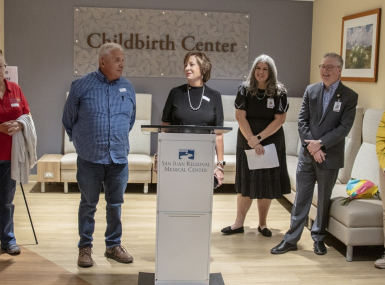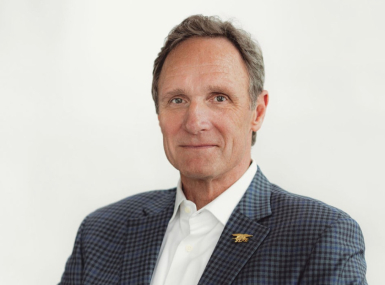Town Hall Meetings Have Gone Out of Style
Author

Larry Schooler
Upcoming Events
Related News

Imagine taking a seat in a space that resembles a theater or a house of worship or a courtroom.
Now imagine having a real conversation with anyone in that space — particularly the main speaker, standing quite far away from you, maybe even standing on a stage or sitting on a dais.
We don’t go to court, or the theater or our worship spaces, with an eye toward having a back and forth dialogue with the judge or the actors or the clergy (though some preachers surely entice some “amens” and “hallelujahs,” but that’s about all). We come to receive something — maybe entertainment, inspiration or justice — without expecting to play much of a role in the event itself.
But that is the very setting we expect our own citizenry to accept when we invite them for a chat. We may call it a “town hall meeting,” but we have migrated pretty far away from the New England tradition of giving every resident a direct voice in the town’s affairs.
Instead, we are privileging some citizens over others by expecting people to speak in front of a crowd of hundreds or thousands. It should not surprise us that the citizens who most often take advantage of that opportunity are an infinitesimally small percentage of the population as a whole — often the angriest among us, or those with more extreme points of view, for whom a microphone represents a golden opportunity to vent.
And why, you may ask, would they be angry?
Picture this. You come home from work and without prior warning, your spouse has redecorated your entire home, even thrown out some furniture you liked. Maybe you like the new look, but chances are, you would be so taken aback by the process that you could not even form an opinion on what the house looked like. You would probably feel so slighted not to have been consulted ahead of time that you forget all about whether you like the new look.
Constituents often feel the same way. They read in the paper or hear on the news that their elected officials are leaning toward a major policy decision, or have even already made that decision, and only then are they scheduling a “town hall” to talk to their constituents about it. Imagine if you read a headline that read, “County plans to remove all statues with ties to the Confederacy.” Even if, ultimately, county residents determined that those statues belong in a museum or elsewhere, they would likely take umbrage at being told that was happening, rather than given the chance to weigh in on what should happen.
Nothing about the current iteration of a town hall meeting befits its name. Agendas or objectives for the gathering are seldom seen. Crowds drown out the speaker. Attendees never get to share their views, or get questions answered, much less influence policy decisions. Insults are even exchanged — both by the crowd and the presenter.
Who benefits from this? It might seem like a constitutionally protected expression of the right to assemble, petition and speak, and to a degree, it is. But what happens when my opinion is different from the cheering or sneering many? Chances are I will choose to hold my tongue — or the organizer will end the meeting when they have had enough of the verbal abuse. So, my elected official is unable to hear my point of view — and, undoubtedly that of many others — and may make policy decisions with incomplete, or even inaccurate information about his constituents’ views.
Unquestionably, however, elected officials need to face their bosses (constituents) and take accountability for their actions, or do their jobs as decision-makers by asking their bosses what they should decide. But the most recent wave of town hall meetings — or perhaps pep rallies for angry constituents — suggests the model needs an overhaul.
If, indeed, the purpose of these kinds of gatherings is to allow the elected official to understand his constituents’ point of view than conversation held around a single table, in a smaller group, with the help of a facilitator who keeps the group focused on its agenda and mindful of its discussion agreements, could yield far better results than the status quo.
So, too, could thoughtful uses of technology improve the people’s access to those in power. A basic social media account, on Facebook or Twitter for example, can reproduce some of the same dynamics at the packed gymnasium — unvarnished vitriol, limited information exchanged, many voices silenced. But a moderated video chat with multiple participants who can see one another, or a televised meeting that enables participants to call or send a text message (and even be part of a small group in those contexts), can change the dynamics of the conversation significantly.
Of course, in many contexts, elected officials have thousands, or even hundreds of thousands, of constituents. Perhaps the time has come for investment in a “conversation corps” — an army of trained facilitators who make civil, civic dialogue possible for people all across the country, in settings that feel comfortable, familiar and inviting.
Perhaps the resources of iconic internet brands can be brought to bear in this regard — taking the vast reach of their platform and creating small, diverse conversational cross-sections of a community or a county. Imagine the possibilities if we could talk to someone with whom we disagree, even passionately, and find even the smallest sliver of common ground. It is difficult to find someone for a conversation like that, but it has become easier with technology.
Ultimately, as a country, we should expect more of our elected officials and how responsive they are to our concerns. But they will only change if we change the conversation.
Attachments
Related News

Now I know I can adapt my communication style
San Juan County, N.M. Commissioner Terri Fortner spent her career working with people one-on-one, but she overcame hangups about online communication when the pandemic forced her onto video calls when she first took office.

County service meets a veteran’s need for purpose in Spotsylvania County, Virginia
After Drew Mullins transitioned from a high-performance lifestyle in the military, he found the environment and purpose he sought when he took office in his county.
Now I know that solid waste is complicated
Custer County, Idaho Commissioner Will Naillon says solid waste removal is "one of the things that people often take for granted until it’s their job to make sure it happens... that’s the story of being a county commissioner."